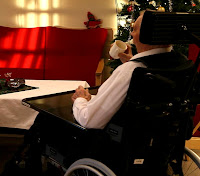This blog has moved to a new website
Nutrition, Health & Wellness
Loneliness among elderly people has been connected to poor health, higher morbidity and mortality. Such feeling in the elderly may raise the potential for certain health risks including depression, suicidal tendency, increased stress, decreased memory, altered brain function, depressed immunity, high blood pressure and heart disease.
The meaning of loneliness
Loneliness may be defined as a lasting emotional state of estrangement, a feeling of being misunderstood, a feeling of rejection by others and lack of social partners for desired activities. This feeling often occurs in adolescents and aged people. However it is transient in adolescents. In elderly, it can lead to social isolation and reduced contacts with other people.Loneliness and health of elderly
In the news release "Loneliness Linked to Serious Health Problems and Death Among Elderly" on June 18, 2012, Leland Kim (Senior Public Information Representative of University of California, San Francisco) informed that"Loneliness — the unpleasant feeling of emptiness or desolation — can creep in and cause suffering to people at any age. But it can be especially debilitating to elderly and may predict serious health problems and even death, according to a new study by UCSF researchers ( Carla Perissinotto, MD, MHS et al)." The study found that only 18% persons above sixty years lived on their own. 43% of the elderly people surveyed suffered from loneliness. The study concluded that among the participants who were older than 60 years, it was a predictor of functional decline and death.
Regarding the health of people living in isolation, Michelle Mitchell, Charity Director General of Age UK said: "Living in isolation and loneliness is a stark reality for too many people in later life, and feelings of loneliness can have a significantly adverse effect on physical and mental well-being."
Causes of loneliness
Death of a life partner or a close friend, lack of companionship, chronic illness and lack of friends are the most common causes of seclusion. Lack of companionship and emotional support can cause elderly to internalize negative feelings which can compound the sense of isolation and affect their health. This feeling can affect both, mental and physical condition of the elderly people.There is a well-established relationship between loneliness and aging. Natural aging process brings about a number of changes in a person. Decreased functional ability and efficiency impacts the health. The following aging related afflictions cause poor self-rating of health and seclusion:
- Decreased cardiac output
- Diminishing ability to respond to stress
- Loss of bone density
- Loss of muscle strength and size
- Decreased lung capacity
- Decreased gas exchange
- Degenerative diseases of joints
- Increased response time to stimuli
- Impaired vision
- Impaired hearing
- Cognitive decline
- Cognitive impairment
- Sleep disturbances
- Higher fatigue levels
- Decline of functional ability
- Reduced cerebral circulation affecting balance.
Coping with loneliness
With higher longevity coupled with reduced birth rates, the proportion of aged people in the population is increasing throughout the world. Immediate nationwide measures are required to reduce seclusion and isolation. Loneliness can be alleviated to a certain extent by activities, like reading, gardening, handcraft, light housework, television watching, keeping pets, attending social gathering or taking part in voluntary work.Support from family and friends, regular contact with family, family involvement in their care and deep, engaging communication between the family members have immense positive effects in coping with loneliness. Forming groups to check the status of health of the elderly in the communities and neighborhood and involving young people in their care can go a long way towards mitigating their health problems and loneliness.
Related topics in fitness tips:
Chronic sinusitis.
Benefits of cloves. Soft drink production.
Sugar substitutes for diabetics.
Soft drinks and obesity.
High fructose corn syrup dangers.
Charles-edward amory winslow.
High fructose corn syrup production.
Why is it called soft drink.
Soft drinks history.
Chronic sinusitis.
Benefits of cloves. Soft drink production.
Sugar substitutes for diabetics.
Soft drinks and obesity.
High fructose corn syrup dangers.
Charles-edward amory winslow.
High fructose corn syrup production.
Why is it called soft drink.
Soft drinks history.
1. Leland Kim on June 18, 2012. Loneliness Linked to Serious Health Problems and Death Among Elderly. http://www.ucsf.edu/news/2012/06/12184/loneliness-linked-serious-health-problems-and-death-among-elderly.
2. Archana Singh and Nishi Misra. Loneliness, depression and sociability in old age. Ind Psychiatry J. 2009 Jan-Jun; 18(1): 51–55.
3. Age UK. Published on 28 September 2012 12:01 AM. http://www.ageuk.org.uk/latest-press/over-a-third-of-older-people-feel-lonely/
Interesting topics on fitness tips:
Pregnancy pelvic girdle pain.
Amla fruit.
Skin care in winter.
Symptoms of pneumonia in elderly.
Signs, symptoms and causes of pneumonia in children.
Tears in newborn.
Blocked tear ducts in newborn - Dacryostenosis.
Causes of social anxiety depression and disorder.
Benefits of horseraddish roots and juice.
Severe hypothyroidism disorder and side effects.
Pregnancy pelvic girdle pain.
Amla fruit.
Skin care in winter.
Symptoms of pneumonia in elderly.
Signs, symptoms and causes of pneumonia in children.
Tears in newborn.
Blocked tear ducts in newborn - Dacryostenosis.
Causes of social anxiety depression and disorder.
Benefits of horseraddish roots and juice.
Severe hypothyroidism disorder and side effects.
http://upload.wikimedia.org/wikipedia/commons/thumb/8/87/Nursing_home.JPG/1280px-Nursing_home.JPG
Author: Thomas Bjørkan
License: Creative Commons Attribution-Share Alike 3.0 Unported license.
Current topic on fitness tips:
Loneliness and health of elderly.
